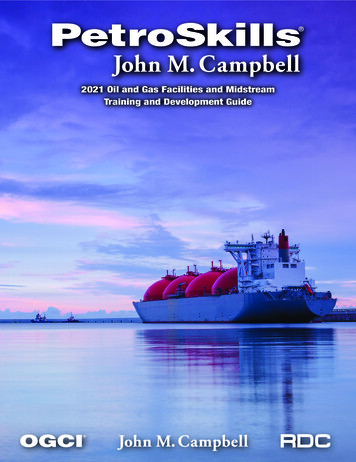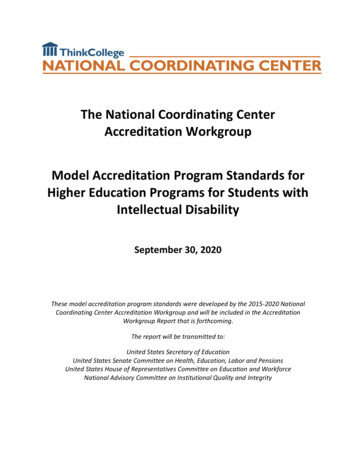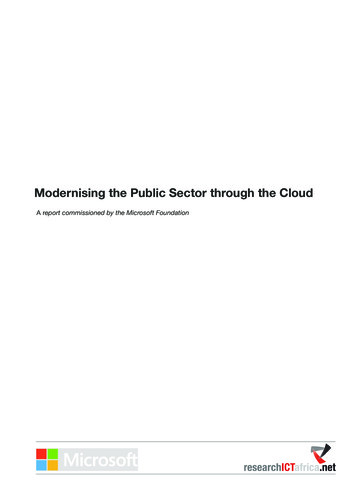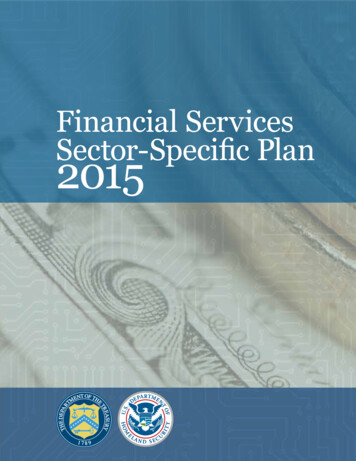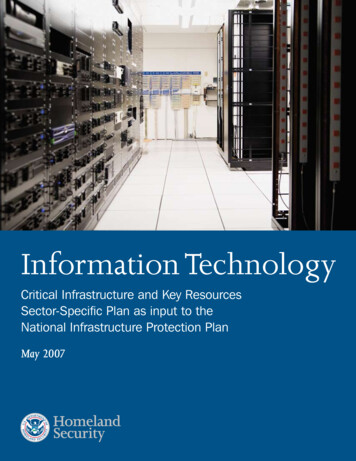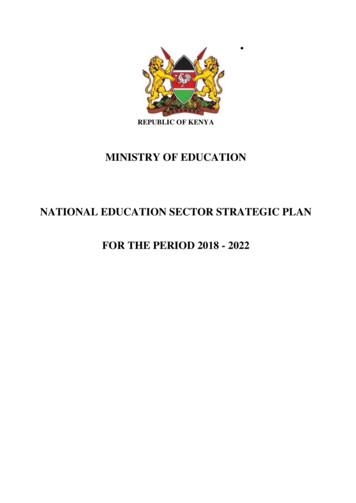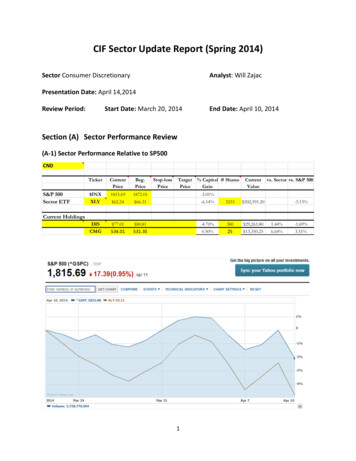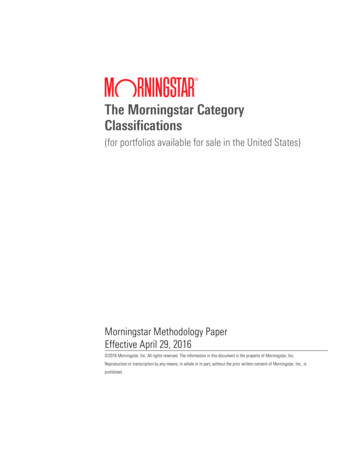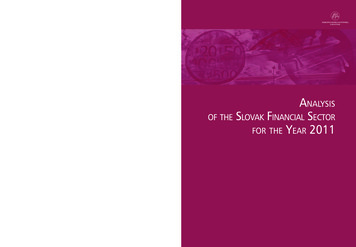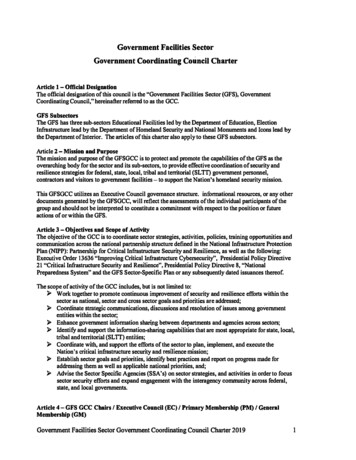
Transcription
Government Facilities SectorGovernment Coordinating Council CharterArticle 1 - Official DesignationThe official designation of this council is the "Government Facilities Sector (GFS), GovernmentCoordinating Council," hereinafter referred to as the GCC.GFS SubsectorsThe GFS has three sub-sectors Educational Facilities led by the Department of Education, ElectionInfrastructure lead by the Department of Homeland Security and National Monuments and Icons lead bythe Department of Interior. The articles of this charter also apply to these GFS subsectors.Article 2 - Mission and PurposeThe mission and purpose of the GFSGCC is to protect and promote the capabilities of the GFS as theoverarching body for the sector and its sub-sectors, to provide effective coordination of security andresilience strategies for federal, state, local, tribal and territorial (SLTI) government persoMel,contractors and visitors to government facilities-to support the Nation's homeland security mission.This GFSGCC utilizes an Executive Council governance structure. infonnational resources, or any otherdocuments generated by the GFSGCC, will reflect the assessments of the individual participants of thegroup and should not be interpreted to constitute a commitment with respect to the position or futureactions of or within the GFS.Article 3 - Objectives and Scope of ActivityThe objective of the GCC is to coordinate sector strategies, activities, policies, training opportunities andcommunication across the national partnership structure defined in tile National Infrastructure ProtectionPlan (NIPP): Partnership for Critical Infrastructure Security and Resilience, as well as the following:Executive Order 13636 "Improving Critical Infrastructure Cybersecurity", Presidential Policy Directive21 "Critical Infrastructure Security and Resilience". Presidential Policy Directive 8, "NationalPreparedness System" and the GFS Sector-Specific Plan or any subsequently dated issuances thereof.The scope of activity of the GCC · includes, but is not limited to: ·work together to promote continuous improvement of security and resilience efforts within thesector as national, sector and cross sector goals and priorities are addressed; Coordinate strategic communications t discussions and resolution of issues among governmententities within the sector; Enhance government infonnation shari11g between departments and agencies across sectors; Identify and support the information-sharing capabilities that are most appropriate for state, local,tribal and territorial (SLIT) entities; Coordinate with, and support the efforts of the sector to plan, implement, and execute theNation's critical infrastructure security and resilience mission; Establish sector goals and priorities, identify best practices and report on progress made foraddressing them as well as applicable national priorities, and; Advise the Sector Specific Agencies (SSA's) on sector strategies, and activities in order to focussector security efforts and expand engagement with the interagency community across federal,state, and local governments.Article 4 - GFS GCC Chairs I Executive Council (EC) / Primary Membership (PM) / GeneralMembership (GM)Government Facilities Sector Government Coordinating Council Charter 2019I
The Executive Council (EC) will serve as the authoritative voice of the GFSGCC and the liaison with theGFS Co-SSA’s (Federal Protective Service and the General Services Administration), sub-sector points ofcontact and other sectors.4.1 Chair Roles and ResponsibilitiesThe position of Chair of the EC will be shared between the GFS Co-SSA’s as designated by PPD 21.The GCC Co-Chairs are jointly responsible for identifying and organizing a representational councilcomposed of key representatives from government departments and agencies with sector interest.The Chairs shall: Preside over all regular and, if required, special EC meetings. Serve as the primary point of contact to DHS or other federal agencies. Oversee the coordination of the EC meetings, including coordination of logistics and agendaitems. Create and distribute an agenda notice in advance of each EC meeting and provide any necessaryread-ahead materials. Be responsible for all records of the EC, including but not limited to the original charter, minutes,white papers, correspondence, and current membership enrollment. The Chairs will coordinate with subsector leads any changes or updates to GFS documents suchas the Sector Specific Plan, etc.4.2 Executive Council MembershipThe EC will assist with development of the goals and objectives for the sector and make decisions basedon the findings and recommendations of committees, working groups, and the general membership. TheEC will meet at pre-determined intervals, either in person or via teleconference, to review overallprogress and approve goals and priorities. The EC will, whenever possible, build and act upon on sectorwide consensus. The EC reserves the right to invite or remove participation of additional organizationalrepresentatives as deemed appropriate with a majority vote.The GFSGCC EC consists of designated sector or critical infrastructure leads with the authority to act onthe sectors or critical infrastructure business lines they represent. Organizations named to the GFSGCCEC are:Agency / OrganizationFederal Protective ServiceGeneral Services AdministrationDepartment of EducationDepartment of InteriorDepartment of Health and Human ServicesDepartment of Homeland Security, Cybersecurityand Infrastructure Security AgencyDepartment of Justice, Federal Bureau ofInvestigationDepartment of TransportationDepartment of DefenseFederal Executive BoardSector /Business lineGFS Co-Sector Specific AgencyGFS Co- Sector Specific AgencyEducational Facilities Subsector (GFS Subsector)National Monuments and Icons (GFS Subsector)Health and Public Health SectorsEmergency Services SectorElection Infrastructure (GFS Subsector)Interagency Security CommitteeOffice of Tribal AffairsCritical Infrastructure Bureau Intelligence CouncilTransportation SectorDoD Facilities Management OfficeFederal Executive BoardGovernment Facilities Sector Government Coordinating Council Charter 20192
Participating organizations shall designate one primary and one secondary member. Each member has theflexibility to have other representation at meetings other than the official alternates, such as appropriatesubject matter experts or other interested parties but must clearly identify the representative via email tothe Co-Chairs. Subject matter experts are non-voting participants drawn from any organization fromwhich the GCC needs expertise on an ad hoc basis.EC members should have the knowledge and authority to formulate advice and make decisions on behalfof their constituents, attend all or most of the pre-scheduled meetings (or send senior level designee), andbe available to respond to ad hoc requests from the GFS C o-SSA's.The limited participation at this level is not designed to be exclusive; the group must be limited to ensureclarity of direction and efficiency of process. From time to time, representatives from other organizationsmay be invited to particip te in one or more of the EC meetings. In addition, the EC may scheduleadditional working sessions to involve a broader representation of interested groups.The EC reserves the right to invite ad hoc or ex officio membership to meet expertise requirementsnecessary to fulfill its mission. Ex officio members are defined as non-voting participants whose criteriaand qualifications for participating will be based upon the ongoing needs for expertise and decisions bythe Co-Chairs. The purpose of their membership is for the EC to gain relevant organizational andinstitutional representation and expertise. Ex officio members may attend meetings a nd conference calls.Ex officio membership will be withdrawn, by detennination of the EC, when ongoing expertise is nolonger required.The GFS Co-Chairs will maintain and keep an updated list of all EC members' names and contactinfonnation (i.e., name title, phone number, email address, etc.) which any EC member may request asdeemed appropriate, but only for use of official GFS business. GCC EC members may provide the Co Chairs with the names and contact information of person(s) from their department or agency to participatein GFS activities.4.2.1. Executive Committee Roles and ResponsibilitiesThe members of the executive committee will play a key role in identifying issues of concern to the sectorand conveying them to OHS, providing recommendations, and addressing the issues presented by othersectors. The EC will provide substantive advice and guidance to OHS dll,wing upon their experience andknowledge of government facility critical infrastructure needs and capabilities.The EC will: Approve the general direction of GFS initiatives and programs, evaluate progress and approvechanges in direction and scope for the overall GCC activities. Provide advice, feedback and support to the Co-SSA"s and other stakeholders. Create and disband project or issue-specific working groups and committees as they deemappropriate. Act as a liaison with other sectors and coordinate joint projects. Resolve issues requiring policy, procedural, or other business decisions as needed. Represent and advocate for issues involving the GFS at more senior levels of government andamong sector partners. Prepare appropriate read-ahead and presentation materials for EC review, as required.4.2.2. Rules of EngagementMeetings:Government Facilities Sector Government Coordinating Council Charter 20193
The EC will convene as an GCC at least two times a year and more often when necessary. The EC mayschedule additional meetings as needed. The group will also participate in joint meetings of the GCC atleast two-times a year. There will be a pre-detennined agenda for each meeting. The agenda should be kept at high-level-- . -- dis c:ussions. 1:'he outc omes .f each rn t ing-wiH be do ente4-in writj!}g 11- - at as .appropriate. The meetings will be held in a location that maximizes the EC resources and participants' time.Meetings may be scheduled in conjunction with national or regional meetings that may attract theparticipation of EC members, such as National Homeland Security Consortium meetings. EC meetings are closed to all non-EC members. Non-EC members must have an expressedinvitation by the Chairs.Decisions:The EC will operate by consensus, except in matters of membership which require a majority vote. Only recommendations (documents, policy positions, plans, etc.) that are provided to the ECmembers prior to the meeting shall be voted upon. Individual organizations may present their opinions to OHS on any subject under the auspices oftheir own organization at any time. However, if the issue being presented to OHS is one that is adissenting opinion of the EC, it must be made in full disclosure to the other members of thecommittee.4.3 GFS GCC Primary Membership (PM)The GCC Co-Chairs.are jointly responsible for identifying and organizing a representational councilcomposed of key representatives from government departments and agencies including representationfrom each sub-sector.Participating agencies shall designate one primary and one secondary member.representative. Eachmember has the flexibility to have other representation at meetings other than the official altematest suchas appropriate subject matter experts or other interested parties but must clearly identify the representativevia email to the Co-Chairs. Subject matter experts are non-voting participants drawn from anyorganization from which the GCC needs expertise on an ad hoc basis.Members will work in concert with the EC through participation in project-specific working groups andsubcommittees. They will recommend critical infrastructure protection objectives and action items thesector to the EC. This may include identifying goals, participating in or leading working groups requiredto meet those goals, providing comment and recommendations on GFS EC or federal documents, andproviding feedback on additional issues to the EC as requested. Members will be requested to assist inimplementation, education, and dissemination efforts undertaken as a result of the above.for4.3.1. Primary Member Roles and ResponsibilitiesThe members will designate representatives able to provide substantive advice and guidance to the EC,most frequently via working groups and/or subcommittees, though opportunity for individual feedback isavailable. Members will be required to draw upon their experience and knowledge of government facilitycritical infrastructure needs and capa ilities.Members will: Provide general direction to the GFSGCC by leading and participating in working groups andissuing final recommendations to the EC based on their work;Government Facilities Sector Government Coordinating Council Charter 20194
Provide advice, feedback, and support to the EC, and identify additional subject matter expertsfrom their organizations to contribute to projects; Review working group/subcommittee deliverables upon request; Provide resources in support of their full participation of their departments and agencies;) « p c: t'!t ,a vocate fo the9FS at more senior-le el a,{ gov mm n and. amo11g-membe constituencies; Assist in building partnerships; Communicate decisions, plans, and results to local constituencies; Participate in periodic, pre-scheduled meetings; and Prepare appropriate read-ahead and presentation materials for EC review, as required.4.3.2. Rules of EngagementMeetings: The PM will be invited, but not required, to participate in GFSGCC meetings. Committees and workgroups will meet as needed either in person or via teleconference. The meetings will be held in a location that maximizes the GCC PM's resources and participants'time. Meetings may be scheduled in conjunction with national or regional meetings. GCC meetings are closed to all non-GCC members. Non-GCC members must have an expressedinvitation by the presiding member.Decisions: Working groups and subcommittees will operate by and act upon consensus. Dissenting opinionsshould be discussed and noted in the meeting minutes. Only recommendations (documents, policy positions, plans, etc.) that are provided to the workinggroups, subcommittees, or members prior to the meeting shall be voted upon. GFS-related decisions and recommendations of working groups and subcommittees will be ses;itto the EC for final approval or incorporation into broader EC recommendations. Individual organizations may present their opinions to OHS on any subject under the auspices oftheir own organization at any time. However, if the issue being presented to DHS is one that is adissenting opinion of the GFSGCC, it must be made in full disclosure to the EC.4.4. General Membership (GM)GFS GM is open to all federal, state, local tribal and territorial governments. GM will includerepresentatives from government organizations representing the "owners / operators" of Federal andSLTI government departments and agencies, in addition to representatives from all members of the EC.Member representatives will notify and coordinate their participation with their designated agencyprimary and secondary members.GM representatives should have the knowledge and authority to formulate advice and make decisions onbehalf of th ir constituents, attend all or most of the pre-scheduled meetings and be available toparticipate in working groups or subcommittees, and respond to ad hoc requests from the ExecutiveCommittee. Attendance will be required at pre-scheduled biannual meetings or special meetings asneeded. Organizations are invited to become members only at the sole discretion of the EC, who mustapprove of the invitation with a majority vote. The EC may also exp l any member.GM will work in concert with the EC and the PM through participation in GCC meetings and project specific working groups and subcommittees. They will contribute to infrastructure protection objectivesby participating in working groups, subcommittees and personal recommendations based on theirknowledge and expertise. GM may assist in implementation, education, and dissemination effortsundertaken as a result ofGCC projects and programs.Government Facilities Sector Government Coordinating Council Charter 20195
4.4.1. Eligibility for General MembershipGM representatives should have the knowledge and authority to formulate advice and make decisions thatreflect the best interest of their discipline and the sector, attend all or most of the pre-scheduled meetings,. be available-to participate in working groups or subcommittees, and respond to ad hoc requests from the -·aipre scheduiedor.speciafmeet1ngs neededis·requirecf. - . - . . - -Ec· .-AfrendancemeetingsasOrganizations or individuals may be recommended for associate membership to the EC by any member.However, the EC must approve of the invitation with a majority vote. The EC may also expel anyassociate member.4.4.2. General Member Roles and ResponsibilitiesGM will provide substantive advice and guidanc to the EC, most frequently vi working groups and/orsubcommittees. GM will be required to draw upon their experience and knowledge of GFS needs andcapabilities.Members will: Provide general direction to the GFSGCC by participating in working groups and subcommittees; Identify additional subject matter experts (SMEs) as needed; Provide resources in support of their full participation of their departments and agencies; Represent and advocate for the GFS within the government and among member constituencies; Assist in building partnerships; Communicate decisions, plans and results to local constituencies; Participate in periodic, pre-scheduled meetings; and . Prepare appropriate read-ahead and presentation materials for EC review, as required.4.4.3. Rules of Engagement Organizations or individuals are expected to represent the interest of the GFS. Participation is notto be used for personal or corporate gain, or to further the interests of another sector or entity. Organizations or individuals may present their opinions to OHS on any,subject under the auspicesof their own organization at any time. However, if the issue being presented to OHS is one that isa dissenting opinion of the GFSGCC, it must be made in full disclosure to the executivecommittee.Article V - Governance and OfficersThe EC will make all policy decisions by a consensus of those participating in the decision, which must ata minimum be a quorum (see 5 . 1 ). Where consensus is not possible on a policy matter, no decision willbe adopted by the EC. With adequate notice, the EC may make policy decisions by email. Suchdecisions will require a consensus of those responding, which must at a minimum be a quorum., EC members will make decisions through a consultative process, encouraging the exchange ofinfonnation an points of view, and will strive to understand and close the gaps creating thedisagreement. Dissension will be recognized, and reasons clearly understood by all other members of theEC. EC members will strive to meet timelines and deliverables even when there is less than fullagreementThe EC recognizes that each member represents a government entity with inherent legal authorities andparameters within which they must operate. At times, these authorities may restrict a memberrepresentative's ability to provide agreement on a decision. These inherent legal authorities must beclearly articulated so to be understood by the EC, as the basis for dissent and the inability to provideGovernment Facilities Sector Government Coordinating Council Charter 201 96
consensus. The EC also recognizes that members may not always have a stake in every issue discussed.Any member may abstain from voting if their programs or authorities are not involved, thereby deferringto members who are stakeholders and have specific competence in the issue at hand.-- - s .Jc.,Q g r!J glA quorum for decision making is ·defined·as consisting of at least one representative from a majority ofvoting members. Attendance is either by in-person participation or via conference call. A quorum fordecision making shall be at least 75% of the GCC membership.5.2 OfficersThe GCC is chaired by the Co-SSAs; the chairs will facilitate the sector decision-making process usingstandard business practices. They will work in consultation wit h the EC to reach consensus on GCCbusiness and through this process identify the means by which each decision will be communicated toappropriate government entities.Article VI - MeetingsThe GCC will meet regularly in Washington, DC Metro Area with additional scheduled meetings and/orconference calls as needed. If members of the EC are unavailable to attend in person, a conference callnumber will be provided to them. Topics of discussion will focus on sector strategies and activities. The Co-Chairs will establish the agenda based on input from the EC prior to the scheduledmeeting; The EC will hold its discussion for a set amount of time or upon agreement/closure; The EC will bring in Subject Matter Experts as needed;Article VD - Subcommittees, Special Committees and Working GroupsSubcommittees, working groups and/or special committees are subordinate to the EC, and report theiractivities and findings to the EC Subcommittees, working groups and/or special committees areestablished when substantial investigation, research or other tasks are required which cannot be achievedat a regular EC meeting.Through their primary or alternate representatives, each PM member may designate individuals to serveon working groups or act as representatives on subcommittees, working groups and/or special committeeleads.'In addition, individual EC, PM or goverpment SME may volunteer by emailing NIPP-GFS@ice.dhs.gov.Working group membership will be selected by the Co-Chairs. If substantial work effort is requiredthrough working groups, the Co-Chairs will ask for a volunteer to lead the working group, if no membervolunteers the Co-Chairs will appoint a lead member for the working group. The working group maymeet as a plenary body or in any combination of subgroups that is m9st conducive to the effectiveconduct of its activities. All products of the working gr:oups will advise GCC on various issues, directionsand processes.7.1. Working Groups and SubcommitteesWorking groups and subcommittees will address specific issues within the sector as identified orapproved and assigned by the EC, and lead by a PM. These entities may research and seek out commenton issues, fonnulate draft policy and/or implement projects. The work of these groups may or may not besubmitted to the PM for review and comment unless at the discretion of the EC. The subcommittee orworking group will make a formal recommendation of action to the EC.Government Facilities Sector Government Coordinating Council Charter 201 97
Working groups and subcommittees will be formed by the EC with representatives from organizationsfrom all levels of membership, plus additional sector organizations, and cross-sector representatives asappropriate.7.1.2. Working Group and Subcommittee Members-. Workirig ·groups and- subcommittees may corisist of any member or representatives from any interestedGFS or stakeholder organization as assigned by the EC or PM. A pool of practitioners will be establishedto tap into the resources and perspectives of the larger GFS community. SMEs, who are not part of theGFS may be called upon by working group or subcommittee members to provide infonnation or commentwhen appropriate.Organizations may select their representative to serve on working groups and subcommittees and haverepresentatives on multiple groups simultaneously. The names and contact infonnation of a primary andalternate representative shall be provided GFS Co-SSA's or working group/subcommittee Chair. Due tothe potential number of participants involved, meetings may be restricted to just one representative perorganization.7 .1.3. Working Group and Subcommittee Roles and ResponsibilitiesWorking Group and Subcommittee members shall: Participate in meetings and teleconferences as needed; Allocate resources as needed to provide appropriate information, research, recommendations, andfeedback to the EC; Coordinate with their respective agencies to educate them on the GFSGCC goals and progress;and; Ensure appropriate representation of all levels and disciplines within the GFS.7.1.4. Working Group and Committee Rules of EngagementMeetings: Individual working group and subcommittees will convene as needed. There will be an agenda and read-ahead materials for each meeting or teleconference. Theoutcomes of each meeting will be documented in writing and communicated as appropriate. The meetings will be held in a location that maximizes the GCC's resources and participants'time. Meetings may be scheduled in conjunction with national or regional meetings that attractthe participation of working group and subcommittee members.Decisions: The working group and subcommittee will not be a decision-making body. Instead, the workinggroup and/or subcommittee will provide infonnation1 and recommendations to the GFSGCC EC.Article 8 - RecordkeepingAll records of meetings held will be handled, stored, and maintained in accordance to the OHS federalrecords management guidelines.Article 9 - CommunicationsThe Co-Chairs will ensure a communication mechanism exists for sharing infonnation among the GCCmembership.The GFS relies on the Homeland Security lnfonnation Sharing Network .,,, Government Facilities Sector(HSIN-GF) as the principal operational tool to communicate sensitive threat infonnation to the sector.The GCC may develop or choose to rely on additional or alternative communication mechanisms such as;Government Facilities Sector Government Coordinating Council Charter 201 9g
classified systems, secure video teleconferences (SVTS) or general email. These mechanisms may. provide additional amounts or types of information.The Co-Chairs will coordinate all GCC information sharing and infonnation dissemination. If a memberwould li e to share infonnation with the GCC, that member shall coordinate with the Co-Chairs. The Co- .Chairs will occasionally solicit infonnation from the GCC. This request for infonnation may be inresp nse to an incident, identification of best practices or reporting to executive level entities.Article 10 - CIPAC Membership and RepresentationOHS established the Critical Infrastructure Partnership Advisory Council (CIPAC). CIPAC facilitatesinteraction between government officials and representatives of the state/local government andcommunity of owners and/or operators for each critical infrastructure sector defined by PPD-21 andidentified in the NIPP. When participating in CIPAC activjties, the GFS GCC will comply with allrequirements defined in the CIPAC Charter and guidance issued by the CIPAC Designated FederalOfficer within the CIPAC Executive Secretariat-:CIP AC membership is defined in the CIPAC Charter. GCC member organizations shall automatically bea CIPAC Member upon notification frpm the Chairperson to the CIPAC DFO via CIPAC@hg.dhs.gov.A CIPAC Member may have more than one CIPAC Member Representative. The MemberRepresentative's name and contact information shall be added to the CIPAC Attendee Roster uponnotification to the CIPAC DFO by the Council Chairperson via CIPAC@hg.dhs.gov.The procedures for maintaining a CIPAC Member Representative list is as follows: GCC Members will inform the GCC Co-Chairs via email of their Member Representatives toparticipate in CIPAC activities. Membership Rosters. The GCC Co-Chairs will maintain a list of GCC members, which anymember may use as deem appropriate. The GCC Co-Chair will infonn the CIPAC DFO viaemail of changes and/or updates to the membership rosters on a quarterly basis, or as required.Article 11 - AmendmentsThe EC may at any time amend this Charter by consensus of the membership. The amended Charter willbe forwarded in a timely manner by the Co-Chairs for distribution to the CIPAC Executive Secretariatand membership.Article 12 - DurationThis Charter will be in effect for five years from the date of signing If amended, the Charter will be ineffect after the amendment is approved. The GFSGCC EC will review annually any proposed changes asnecessary for consideration.Article 13 - ApprovalThis charter is accepted and adopted by the GFSGCC EC on October 30, 201 9 according to councilprocedures, as attested to by the following authority.Co-Chair GCCChristopher A. ColemanDepartment of Homeland SecurityFederal Protective ServiceCo-Chair GCCMichael GriffinU.S. General Services AdministrationOffice of Mission AssuranceGovernment Facilities Sector Government Coordinating Council Charter 20199
phone number, email address, etc.) which any EC member may request as deemed appropriate, but only for use of official GFS business. GCC EC members may provide the Co Chairs with the names and contact information ofperson(s) from their department or agency to participate in GFS activities. 4.2.1. Executive Committee Roles and Responsibilities
